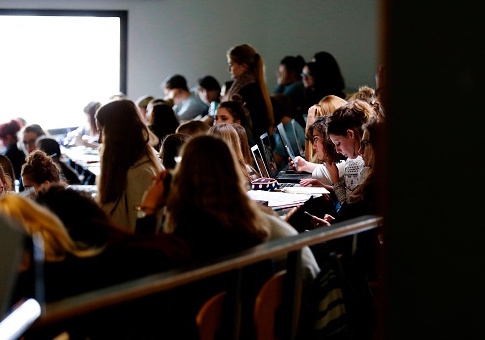A new study examining the country's views on free speech found that 62 percent of students feel they are prevented from saying things they believe, and right-leaning views have taken the hardest hit.
Emily Ekins, the director of polling at the libertarian Cato Institute who conducted the study, told the Washington Free Beacon that both Republicans and Democrats reported it is their more conservative views they are wary of sharing, demonstrating that the left-of-center controls "social power."
Liberals reported feeling uncomfortable saying they thought Confederate statutes shouldn't be taken down; that supporting the First Amendment doesn't equal racism; or that identity politics has gone too far.
Meanwhile, 50 percent of students say the dominant political view on campus is liberal. Only 20 percent believe their campus has a "balanced mix" of political perspectives.
"We don't see conservatives reporting they are uncomfortable expressing liberal views. It's the left of center that has the social power," said Ekins.
The Cato study, titled "The State of Free Speech and Tolerance in America," breaks down respondents' familiarity with social-justice keywords, support for hate speech statutes, and views on disciplinary action for student protesters who disrupt speakers.
Liberals were more ready than conservatives to support banning speakers and were less likely to advocate for any form of disciplinary action against students who disrupt a speaker, according to the study.
Seventy-five percent of Republicans want some form of punishment for disruptive students, while 64 percent Democrat preferred to see administrators listen to and address the students' demands, as do 56 percent of college students.
"Why we aren't seeing students disciplined for treading on free speech? Well, most college campuses are left of center, and people with those views told us they don't want to see the students disciplined," said Ekins.
Ekins warned about the costs of such behavior.
"If universities give in and cancel any speaker who a substantial number of students find offensive, we will miss out on a wide number of public policy debates society needs to be having," said Ekins. "Here we want to have a conversation about police reform, but how are we supposed to do that if no one is allowed to speak about it?"
Sixty-one percent of students think colleges owe to their students to expose them to all types of viewpoints, but 57 percent think colleges have an obligation to protect its students from offensive speech and ideas. A full 70 percent think it is morally unacceptable to say offensive things.
Though 85 percent of students recognized it would be difficult to ban hate speech, 62 percent still think society can somehow impose such a prohibition while maintaining free speech.
"People are not terribly consistent in principled defenses of speech. They are sure we can protect the First Amendment and curb hate speech," said Ekins. "This is across political lines. Each side has their issues that they want to see people punished for."
Case in point: fifty-four percent of Republicans want to fire business executives who burn flags on the weekend. Eighty-two percent of Democrats responded that saying illegal immigrants should be deported is hateful or offensive.
Meanwhile, college students voiced broad support for passing laws making it illegal to say offensive things about Jews, immigrants, and LGBT individuals.
Ekins attributed support for hate speech statutes among students in part to immaturity and lack of world experience, but said a more troubling fact may be at play.
"What happens when you are 18 to 26 really sticks with you. Older liberals who were students in the 1960s grew up in a time when the censors were on the right, so for them the First Amendment meant—and continues to mean—freedom, the civil rights movements," said Ekins. "But a lot of younger students associate the First Amendment with Trump and Milo Yiannopoulos, who mocks transgender people."
"Today’s students aren't seeing the First Amendment as a tool to overcome oppression, and that won't change," said Ekins.
Cato conducted its survey with the help of YouGov, which collected responses Aug. 15 to 23 from 2,547 Americans 18 years and older, with a final representative dataset of 2,300.
